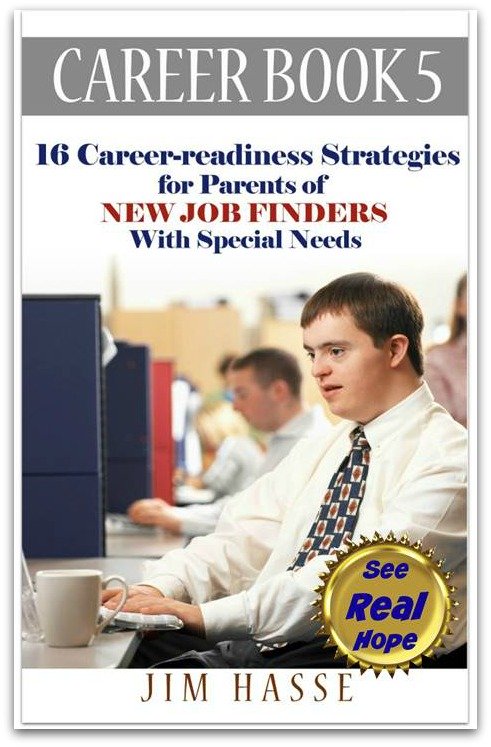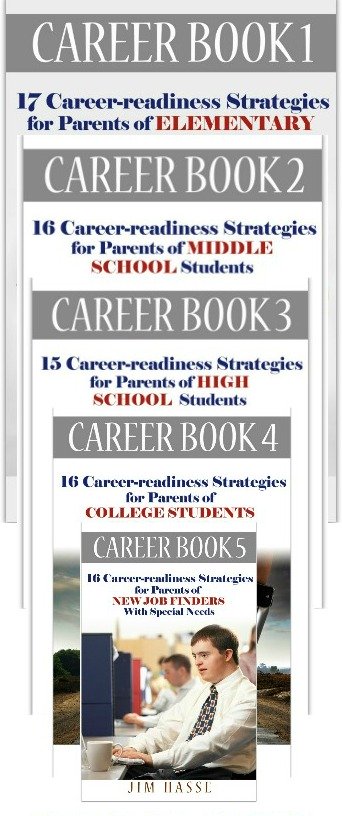Job
Finder: Cerebral Palsy
Career Builder for Job Seekers
By Jim Hasse, ABC, GCDF, Disability Employment Expert
_________________________________________________________
For your job finder with cerebral palsy (CP), each of my 20 articles below (based on National Career Development Guidelines for job seekers) is a career builder.
Those National Career Development Guidelines provide a road map for those who may be out of school, not yet employed and actively seeking work. Finding a job is a full-time job in itself. And, it can be very frustrating (especially when a disability is involved), leading to hopelessness and depression.
As a parent, mentor or coach, how can you best help a grownup job seeker?
First, support the concept that no one is entitled to a job. I’m always troubled when I hear about an individual who has just earned a college degree and expects that he or she has now earned the right to be employed.
In my world, obtaining the credentials for a job is only the first step. As a job finder (a term I believe is more appropriate than “job seeker”), an individual’s task is now to find the right job.
That takes work. It's building and implementing a job marketing plan which eventually puts the job finder into a situation where he or she can say, “You’re the right employer for me, and I’m the right employee for you; here’s why.”
Second, step back from your role
as a coach or mentor at this point and become, instead, a resource person for third-party
ideas.
Here’s one way to do that: Refer your job finder to this entrepreneurial approach to job finding that I developed over 40 years of struggle and triumph (see below).
My entrepreneurial approach to finding a job
Approach
your job search from an entrepreneurial, job finder perspective. Prove to prospective
hiring managers that you can help them realize a “gain” or get rid of a
“pain” that may irritating them. Those hiring managers may not realize they
need what you can offer until you show them.
By doing so, you’re employing the same marketing
strategies entrepreneurs and small business owners use to gain clients or
customers. Instead of marketing a product or service, you’re promoting yourself
as a job candidate. You're positioning yourself as a job finder.
On my first job during the 1960s, I has hired because
the CEO of a small dairy processing cooperative needed someone to edit a
newsletter for the dairy farmer members who supplied milk for Chicago metropolitan area. That newsletter
was government-mandated under the Chicago Regional Federal Milk Marketing
Order.
Fresh out of journalism school, I was quite confident
I could handle that assignment -- something no one else at the cooperative’s
central office wanted to “be bothered with” in a rapidly growing organization
in which most of the management staff were preoccupied with learning how to
effectively carry out “line” functions.
Yes, “staff” functions were important but not a
priority as everyone seemed to be scrambling to integrate milk processing
operations as new plants were added to the mix through merger and
consolidation.
Focusing on the newsletter, I switched printers,
going from letterpress to offset printing. I learned photography. I found a
reliable photo processing lab. I developed editorial guidelines and policies.
But, after a few months, I discovered several unmet
needs that were unique to my work situation and that I could fulfill as a
“corporate communicator,” a term (and function) that had not yet been used or
fully defined within what is today called “business communication” or “brand
management.”
I helped our CEO establish a column in the print
newsletter so he could tell about the changes taking place in the organization
and how they affected dairy farmer members and employees. To save him time, he
would give me a topic for his column, and I would research and write it for
him.
He gradually recognized the value of his column as one
of the ways he could use to carry out his leadership responsibilities. Then I
found myself writing the speeches he needed to give to milk producer and
industry groups ranging from such venues as southwestern Wisconsin district
meetings to the National Milk Producers Federation in Washington, D.C.
While helping my CEO find his “voice,” I also became
the unofficial speech writer for the president of the organization’s board of
directors, who was also involved in local meetings as well as dairy associations
throughout the U.S.
I then found myself helping both individuals deal
effectively with print and broadcast media.
As one function led to another, I was becoming an
“innovator” in the eyes of these two top decision makers -- at the surprise of
all three of us. In some respects, I has becoming an on-the-job job finder for myself. And, as a result, I was developing job security in a business
which was about to enter (and survive) a 20-year restructuring phase within the
U.S.
dairy industry.
My CP was irrelevant in each of the
functions I added to my job responsibilities as the cooperative grew and
survived that restructuring process. I eventually became vice president for
corporate communication and helped the organization develop a strategic
planning process and organizational development initiative.
During the second decade of this new century,
approaching your job hunt as an entrepreneur (and a job finder) is still a smart career
strategy. After all, now more than ever before, you (not your parents, not your
career coach, not your spouse, not your mentor, not your current employer) are
responsible for building a career that is meaningful for you.
And, in today’s world, getting a meaningful job is
not an automatic right. It’s something you must earn by proactively
accumulating the knowledge and skills required to do that job. Select a job you
know you can do -- that will give you an opportunity to grow and that you can do
well with your type of disability. You then need to go out and convince others
that you’re right for that job.
Become a job finder entrepreneur by researching your
targeted employers and discovering the functions you can uniquely provide and
that they don’t yet have (but need) if they are to continue to be successful.
Use LinkedIn to network with people who can
potentially be your “boss.” Discuss issues which are “hot” right now within
your particular field, profession or job sector. Demonstrate your
entrepreneurial focus. Be helpful to others by answering LinkedIn questions
which pertain to your field. Establish relationships that are mutually
beneficial without referring to your profile or resume.
Also use LinkedIn to establish relationships with
current employees, past employees, newly hired employees or departing employees
of your target employer. Through your discussions, you’ll likely learn about
your targeted employer’s strengths as well as its weak points -- the “gain” or
“pain” you can address as a job finder.
That’s called company research. The more you can
learn about the strengths and weaknesses of your targeted employers (and how to
take advantage of those strengths and weaknesses) the better.
Conducting savvy research on the employers you’re targeting will give you the edge over just-as-qualified, non-disabled job seekers who are trying to get the job you want but are not as prepared as you are as a job finder.
What your job finder should be able to do
According to the National Career Development Guidelines (NCDG), these are the 11 career development competencies your young job finder should possess at the “implementation” level while making the school-to-work transition:
-
Valuing one’s personal
interests, likes, and dislikes as a step toward building and maintaining a
positive self-concept.
- Practicing respect for diversity as an essential positive
interpersonal skill.
- Anticipating growth and change as essential parts of
career development.
- Achieving a balance among personal, leisure,
community, learner, family and work roles.
- Acting on the premise that educational achievement and
performance levels are needed to reach personal and career goals.
- Committing to ongoing, lifetime learning as a means for enhancing
one’s ability to function well in a diverse and changing economy.
- Creating and managing a career plan for meeting career
goals.
- Making decisions within an overall personal strategy for managing a
career.
- Using accurate, current and
unbiased career information in
planning and managing one’s career.
- Accumulating consistently the
fundamental knowledge about the variety of skills that are important for success and advancement in
school and work, such as communicating, critical thinking, and problem
solving.
- Analyzing changes in employment trends, societal needs and economic conditions and the impact they have on one’s career path.
The content of my web site follows the NCDG framework for each of these five stages in your job finder's development:
-
Elementary, when your
child becomes aware of job titles.
- Middle/junior high, when your
youngster begins to appreciate individual personalities and preferences
among family and friends through a simple career test.
- High school, when your
youngster needs to start gaining work experience through part-time jobs.
- College, when your
youngster needs to master specific job seeking skills, such as absorbing and
implementing interview tips.
- Job search, when your young son or daughter becomes a job finder by putting together job seeking skills into a comprehensive marketing campaign and career management approach that he or she can routinely update throughout a lifetime.
As your son or daughter progresses through each of these five developmental milestones, I’ll show you the barriers I personally encountered (and worked around) and the options you both can consider as viable “workarounds.”
20 articles (career builders) for job finders
Specifically, I have divided the 11 NCDG competencies for your young adult into two sets of 10 disability-focused articles. One set is based on self-confidence, and the other set is focused on competitive advantage for your job finder:
10 career builders which foster your young adult's self-confidence. These include developing:
-
Self concept (Importance of Motivation, Gaining Self-confidence)
- Career mindedness (Career Assessment Information,
Myers Briggs)
- Decision making skills (Developing Self knowledge, Work Diversity)
- Career information gathering
abilities (Career Builders, Online Jobs)
- Career path management skills (Example of Personal Development, Guidance Counseling)
10 career builders which provide opportunities to discover a personal competitive edge. These include developing:
-
Interpersonal communication
skills (Importance of
Interpersonal Communication, Communication
Skill Builders)
- Balance between work and
personal time (Job Interview Questions,
Goal Setting for Adults)
- Educational and lifelong
learning orientations (Sample Functional Resume, Entry
Level Jobs)
- Career trend tracking
abilities (Salary Calculator,
Occupational Outlook Handbook)
- Job marketing skills (Personal Brand, Work From Home Jobs)
In essence, each of these career builders will ultimately help your young adult develop into a job finder who can compete effectively in his or her chosen field.
Since 1997, I’ve met many accomplished people with CP who are successfully working within a wide variety of occupations. On this site, you’ll find their success stories (and how their parents and other mentors have helped them succeed).
Follow me, and you and your son or daughter with CP will also have the opportunity to share your views about specific mentoring issues as well as personal success stories with others facing some of your same challenges.
You'll have the opportunity to grow together within each of the above stages of discovery and learning.
Return from Job Finder to Cerebral Palsy Career Builders
This is Creative Commons content. You can freely and legally use, share and repurpose it for non-commercial purposes only, provided you attach this sentence and the following attribution to it (including the two links):
Originally written and illustrated by Jim Hasse, ABC, GCDF, owner of Hasse Communication Counseling, LLC, who, as a person with cerebral palsy, served for 10 years as a vice president in a Fortune 500 company during his 29-year career in corporate communication. He’s an Accredited Business Communicator, certified as a Global Career Development Facilitator and author of 14 Amazon books about disability awareness and disability employment issues.





